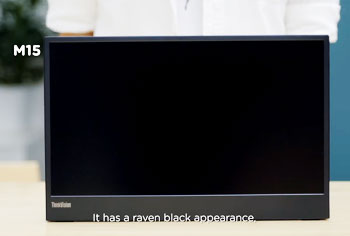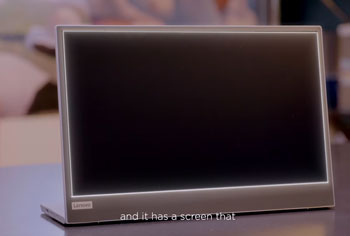Lenovo makes excellent monitors for office and home use. Two of their most popular options are the M15 and L15 displays. Both provide a quality viewing experience but differ across some key specs.
In this detailed guide, we’ll compare the Lenovo M15 versus the L15 monitor to help you select the right model based on your needs and preferences. Let’s dive in!
A Brief Comparison Table
| Feature | Lenovo M15 Monitor | Lenovo L15 Monitor |
| Display Specs | ||
| Screen Size | 15.6 inches | 15.6 inches |
| Resolution | Full HD 1080p | Full HD 1080p |
| Panel Technology | IPS | IPS |
| Refresh Rate | 60Hz | 75Hz |
| Adaptive Sync | AMD FreeSync | None |
| Bezels | Ultra-thin on three sides | Minimal side bezels but larger bottom bezel |
| Stand Adjustability | Tilt adjustable stand | Height adjustable stand with tilt |
| Built-in Speakers | Yes | No |
| Audio Jack | Yes | No |
| Anti-glare Coating | Yes | Yes |
| Weight | 3.97 lbs | 6.17 lbs |
| Display Performance | ||
| Response Time | Under 10ms | Under 10ms |
| Brightness | 220 cd/m2 | 300 cd/m2 |
| Color Coverage | Over 90% of sRGB gamut | Over 90% of sRGB gamut |
| Contrast Ratio | 800:1 | 1000:1 |
| Gaming Features | ||
| Adaptive Sync | AMD FreeSync | None |
| Input Lag | Higher latency | Lower input lag |
| Connectivity | ||
| Video Inputs | HDMI 1.4, VGA | HDMI 1.4, VGA |
| Peripherals | Headphone jack, USB 2.0, USB 3.1 | Headphone jack, USB 2.0, USB 3.1 |
| Design and Ergonomics | ||
| Bezel Thickness | Thin bezels on three sides | Minimal side bezels but larger bottom bezel |
| Stand Adjustability | Tilt only | Height and tilt adjustment |
| Footprint | Compact | Larger rear footprint |
| Built-in Audio | ||
| Integrated Speakers | Yes | No |
| Pricing and Value | ||
| Price | Around $250 | Starting under $200 |
| Recommended For | ||
| Ideal Usage | Office work, creative projects, entertainment | Office work, document viewing, cost-conscious shoppers |
| Key Considerations | Slim design, integrated speakers, FreeSync support | Height adjustment, budget-friendly, static content |
Overview of the Lenovo M15
First, let’s look at what defines the M15 monitor:

- 15.6-inch screen with Full HD 1080p resolution
- IPS panel technology for vivid colors and wide viewing angles
- 60Hz refresh rate
- Supports AMD FreeSync adaptive sync technology
- Ultra-thin bezels on three sides
- Tilt adjustable stand
- Built-in speakers and audio jack
- Anti-glare screen coating
- Weighs just 3.97 lbs
The M15 is designed to be a portable and functional monitor good for office work, creative projects, or entertainment.
Overview of the Lenovo L15
Now here are the key details on the L15 display:
- 15.6-inch screen with Full HD 1080p resolution
- IPS panel for accurate color reproduction
- 75Hz refresh rate
- No adaptive sync
- Minimal side bezels but larger bottom bezel
- Height adjustable stand with tilt
- No built-in speakers
- Anti-glare screen treatment
- Weighs 6.17 lbs
Also Read: Comparison Between Humanscale Vs. Ergotron Monitor Arms
Key Differences Between Lenovo M15 And L15 Monitors
The L15 provides a more adjustable ergonomic experience compared to the M15 but drops the integrated audio. Now let’s examine how these Lenovo monitors stack up across important categories.
1. Display Performance Comparison
For any monitor, the display characteristics are most crucial. Here’s how the M15 and L15 compare:
Resolution and Pixel Density
- With identical 15.6-inch 1080p screens, both monitors provide the same resolution and pixel density. Text and images render sharply.
Refresh Rate
- The L15’s 75Hz refresh maxes out slightly higher than the M15’s 60Hz refresh. This results in smoother motion clarity with less blurring.
Response Time
- Both monitors have a fast response time under 10ms to minimize ghosting in fast moving visuals. But the L15 edges out with a quicker 6ms response time.
Brightness
- The L15 achieves a very solid 300 cd/m2 peak brightness for comfortable viewing in bright rooms.
- At just 220 cd/m2, the M15 doesn’t get quite as bright which could limit visibility.
Color Performance
- Thanks to their accurate IPS panels, both displays cover over 90% of the sRGB gamut for vibrant colors ideal for photo/video work.
Contrast Ratio
- With a 1000:1 contrast ratio, the blacks and whites on the L15 avoid looking washed out.
- The lower 800:1 contrast of the M15 means blacks appear more grayish with less pop.
Winner: Lenovo L15. While both provide quality 1080p IPS screens, the L15 pulls ahead in critical areas like brightness, response time, and contrast for a superior viewing experience overall.
2. Gaming Features

For gaming performance, there are a couple key differences between the M15 and L15:
- The M15 supports AMD FreeSync variable refresh rate technology to prevent screen tearing and artifacts during gameplay. The L15 lacks any adaptive sync feature.
- With lower input lag, the L15 will feel more responsive when gaming. The M15’s higher latency may bother competitive gamers.
If you plan to game on your monitor, the M15’s FreeSync support makes it the better fit for smooth stutter-free visuals. But the L15 has faster input response for competitive play.
3. Connectivity Comparison
In terms of connectivity, the M15 and L15 offer very similar options:
- Video inputs on both consist of HDMI 1.4 and VGA. The HDMI port enables Full HD 1080p input.
- For peripherals, you get standard ports like a headphone jack, one USB 2.0, and one USB 3.1.
The monitors are essentially equal when it comes to input and output connectivity. No meaningful advantage for either model.
4. Built-in Audio
One of the main feature differences between the M15 and L15 is integrated audio:
- The M15 features two 2W stereo speakers conveniently built into the monitor.
- You’ll need to provide your own speakers or headphones with the L15 which lacks any sound capabilities.
If you want audio directly from your display, the M15’s speakers give you that simplicity right out of the box. The L15 omits sound to cut costs.
5. Pricing and Value
As you’d expect, the monitors are priced in line with their positioning:
- With more features and stylish design, the M15 retails around $250 making it a great value for a portable 1080p IPS display.
- Starting under $200, the no-frills L15 costs less reflecting the bulky design and lack of speakers or FreeSync.
Both monitors provide pleasing image quality at affordable prices for home or office. But the M15 delivers more value for just a bit more money.
Also Watch This Review Video:
6. Design and Ergonomics
There are some obvious design differences between these two Lenovo displays:
Bezels
- The M15 sports thinner bezels on three sides for a sleeker and more modern look.
- Larger panel borders on the L15 give it a bulkier aesthetic.
Stand Adjustability
- You can easily adjust the height and tilt on the L15 for the optimal viewing position.
- The M15 only offers tilt adjustment lacking the height flexibility.
Footprint
- Despite a larger overall rear footprint, the L15 stand lets you position the display closer to the edge of your desk to save space.
- The M15 stand pushes the monitor farther back eating up more desk real estate.
The L15’s stand offers better ergonomics but the M15 looks more stylish with its thin bezels. Pick based on aesthetics Vs.. adjustability preferences.
Also Read: Choose Between Samsung G9 And CRG9.
Frequently Asked Questions (FAQs)
Below are answers to some commonly asked questions about the Lenovo M15 and L15 monitors:
The Lenovo L15 monitor has a 1920 x 1080 Full HD resolution. This equates to a sharp pixel density of 141 PPI on the 15.6-inch screen size.
The L15 monitor has a 75Hz maximum refresh rate. This enables smoother motion clarity compared to a standard 60Hz office display.
The M15 contains the following ports: HDMI 1.4, VGA, one USB 2.0, one USB 3.1, and a 3.5mm audio jack. This allows you to connect a computer and peripherals.
The M15 weighs approximately 3.97 lbs without the stand and 4.3 lbs with the stand attached. This lightweight design makes it very portable.
Final Verdict
So which Lenovo display comes out on top in this comparison?
The Lenovo M15 is the better choice if you:
- Want a slim modern design with thin bezels
- Plan to use the built-in speakers for audio
- Value FreeSync variable refresh rate for gaming
- Need a brighter screen for well-lit rooms
- Appreciate the easy portability at under 4 lbs
The Lenovo L15 makes more sense if you:
- Prefer greater height/tilt adjustment flexibility
- Don’t need integrated speakers
- Mainly plan to consume static content like documents
- Want to save some money for similar 1080p performance
- Need a larger bottom bezel for CAD/CAM use
Both monitors will serve you well as an office or secondary display. Evaluate your priorities around design, features, and price to pick the right Lenovo screen.
